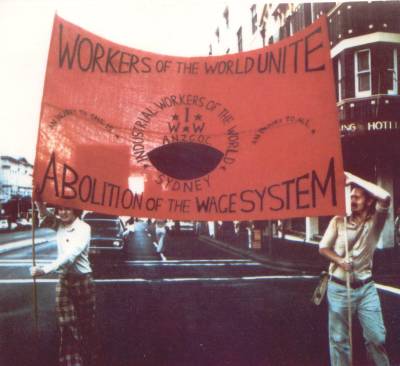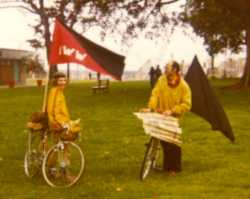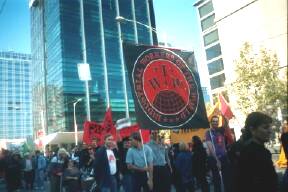



 Wobbly Banner at Sydney May Day Parade, late 1970's
Wobbly Banner at Sydney May Day Parade, late 1970's
Fellow workers Maguire and Goodman holding the Australia New Zealand General Organising Committee (ANZGOC) I.W.W. banner. |
The Industrial Workers of the World recruited new members in Australia during the resurgence of anarchism in 1975-76. This article tells the story of the Sydney IWW meeting in 1982 that erupted in physical violence which lead to the demise of the IWW in Sydney for several years.
Central to the story are issues of accountability and organisational process, especially in regards to the paper, Rebel Worker, which started out as the paper of the Australian IWW. The arguments and passions engendered by the split in the Jura Books Collective during 1982, certainly is a factor to explain the events at the meeting, but subsequent problems with accountability of Rebel Worker shows that the problems were real and have never been resolved.
Subsequent syndicalist organisation is briefly detailed, including the conflict at the 1992 Congress of the Anarcho-Syndicalist Federation (in part over the status of Rebel Worker)., and the revival of the Anarcho-Syndicalist Federation in the late 1990s, and the IWW in the 1990's.
The Industrial Workers of the World had been strong in Sydney during the second decade of the twentieth century, and had an influence far beyound its membership. Their campaign opposing the two conscription referendums were pivotal in the rejection of conscription.(1)
The IWW was declared an illegal organisation under the Unlawful Associations Act 1916. The IWW promptly changed its name. With the Unlawful Associations Act 1917 the IWW attempted to crash through by obstructing the legal system in 'free speech movement' style. Over 80 Wobblies in Sydney were sentenced to 6 months hard labour (the maximum) for simply proclaiming their membership, which was enough to scare many others away from open defiance. This took out of action for 6 months many of the best orators, propagandists and strategists of the IWW - with those not born in Australia being deported at the end of their sentences. Evidently, most of the deportees were sent to Chile where they boosted the local IWW, then deported to Argentina, and on to Scandinavia and Europe. A chain of international protests about the 'Sydney 12' IWW prisoners followed. (2)
In the 1920's and 1930's the I.W.W. had a small presence in Sydney and Melbourne. In Sydney, Angela Westbrook kept the spirit alive during the great depression and second world war, along with anarchist poet, Harry Hooton.(3)
Jack Grancharoff remembers Bert Armstrong as a regular speaker at the Sydney Domain in the 1950's. "This was a generation of old timers and they were disappearing. There were no young people to take over their work." Bert Armstrong's death on 14 February 1975 came just as new interest in the IWW was occurring.(4). Wobblies were still marching in annual May Day parades in Melbourne in 1968.(5)
By 1975 Bill Graham in Launceston Tasmania was the only active member in Australia. I joined the IWW in April 1975 and started actively trying to recruit members from the anarchist scene.(6) Leigh Kendall, in Canberra, also joined during 1975. I remember one of the discussion evenings at the anarchist bookshop at 149 Lawson Street was addressed by IWW member Pat Mackie, who played a pivotal role in the Mount Isa Dispute of 1964/5.

|
In 1976 there were three wobblies in Sydney and the Australia and New Zealand General Organising Committee (ANZGOC) was proposed to continue building the IWW. A vote taken of members setup the committee. An IWW General Defence Committee Local No 5 was formed in Sydney in January 1976. From March 1976 for a year I acted as a delegate collecting dues, signing up members and importing Wobbly literature.
The Sydney Anarcho-Syndicalists was formed as the Sydney group of the Libertarian Socialist Federation, which derived from a split in the Federation of Australian Anarchists Conference held in Melbourne in June 1976. IWW members were involved in this organisation from the start. Jura Books, a development of the Jura Literature Service in Sydney, was initially the bookshop for the Sydney Anarcho-Syndicalists. In May 1979 the last meeting of Sydney Anarcho Sydnicalists was held. It decided to hand over control of the building to the Jura Books Collective with provisos that there were defined procedures for joining and expulsion, and provision for a Library and an IWW office.
In early 1981 the ANZGOC was reorganised as the Australian General Organising Committee, and used a small office at Jura Books. From my recollection the IWW membership in Sydney was composed almost entirely from people who were members or former members of the Jura Books Collective.
An Anarcho-Syndicalist Committee was formed in May 1981 which saw its role as "mainly educational", to support "work in building a revolutionary syndicalist movement":
...we will lend our support to any attempts within Australia to set up such a mass based organisation....The only initiative recently in that direction is the formation of the IWW Sydney Group of a General Organising Committee to rebuild the Australian IWW. The IWW is of course historically the only examply of a large revolutionary syndicalist organization in Australia.(7)
It is not surprising that the passions and emotions engendered by the debates in Jura Books(8), also were evident in the Sydney group IWW meetings. Greg Platt was Secretary of the Sydney IWW Group, but tended his resignation from this position in March 1982, citing "recent developments in relations between me and other members" and "that I no longer have the support which is necessary for the proper functioning of my position as Secretary". The issue which proved contentious in the IWW was the accountability of Rebel Worker to the membership of the organisation.(9)
Rebel Worker was first published as the paper of the IWW in Feb-March 1982. Mark Maguire and Jim Couch did most of the content collection and editorial work for the initial issues. However, the paper was clearly published under the purported editorial control of the IWW Sydney Group, as stated in the General Organising Bulletin.(10)
On September 11 1982, six weeks after the division of Jura Books, there was an Industrial Workers of the World (I.W.W.) meeting in the Jura meeting room attended by Sid Parissi, Jim Couch, Michael Goodman, Mark McGuire (Chairing & Secretary of the Group), Greg Platt and John Englart. Platt raised issues of content and editorial accountability of the magazine, Rebel Worker, to the local Group. After a heated exchange, Jim Couch lunged at Greg Platt and started violently shaking him. Mark Maguire stood up and started also advancing on Platt. I stood up to intervene and Mark McGuire punched me in the face. Sid Parissi and Michael Goodman observed but did not intervene. Goodman said he could not apologize for Maguire's actions but "it was most regrettable". Maguire stormed out of the room saying 'Get Fucked' repeatedly.(11)
Ten days later I sent a letter to the Secretary of the Sydney Group IWW describing the events at the meeting and requesting apologies from Couch and Maguire for their acts of violence and intimidation: no response was ever received. These acts of violence effectively ended the meeting and the Sydney Group of the IWW. After seven years membership of the organisation in Sydney I allowed my membership of the IWW to lapse after October, as I could no longer work with most of the current members. I had been instrumental in restarting the IWW in Sydney in 1975 and 1976. In a matter of months the remaining members would discontinue their syndicalist activity under the IWW banner.
 Rebel Worker Masthead Vol 1 No 1, Feb-March 1982
Rebel Worker Masthead Vol 1 No 1, Feb-March 1982
|
Rebel Worker was published as "paper of the Australian IWW" from the first issue in February 1982 under the auspices of the Australian General Organising Committee. The April-May 1983 edition changed the masthead to "anarcho-syndicalist paper", and contained an editorial collective comment explaining the change from being a paper of the IWW to an anarcho-syndicalist propaganda group. In essence, the Rebel Worker group did not want to be accountable to a wider organisation, and they effectively closed down the local group of the IWW to achieve this.
In 1986 over the January long weekend a conference of anarcho-syndicalists was held in Sydney, with people primarily from Sydney and Melbourne groups, at which the Anarcho-Syndicalist Federation was formed.
The paper "Rebel Worker" will henceforth be the organ of the ASF as a whole. The responsibility for production of "Rebel Worker" was entrusted to the ASF Sydney Group. A "Rebel Worker Charter" was adopted defining the general editorial guidelines and practical mandate for those members of the Sydney Group engaged in the production of the paper - the "Rebel Worker Committee".(12)
The Melbourne ASF had members active in public transport:
The Melbourne local of the Anarcho Syndicalist Federation (ASF) published the first issue of Sparks in May 1986. In February 1987, the Public Transport Workers Association was admitted to the ASF and continued to publish 'Sparks' which became the most popular publication in Melbourne's public transport industry with a circulation of over 5,000. A core group of four to seven people published and distributed Sparks, with many more contributing news and donations to cover its free distribution.The influence of anarcho-syndicalism became most apparent during the 1990 Tramways occupation where workers occupied their depots and ran the service for free before the government cut the power to the system. The Anarcho Syndicalist Federation (ASF) initiative of establishing Passenger Support Groups was another major innovation which allowed members of the community to show their support for the trammies. (13)
An Anarcho-Syndicalist Federation dispute eventuated at the June 1992 congress between Sydney and Melbourne groups. Two new Melbourne groups, the Unwaged Workers Movement and the Melbourne North Local applied to affiliate at this congress. One of the issues was whether Rebel Worker should remain the federation's paper or the paper of the Sydney local. Added to this issue was the alteration of the standard agenda by the Sydney Group to move the issue of Rebel Worker to the top of the agenda before affiliation of groups, ostensibly to keep control of the production of Rebel Worker as the paper of the Federation. It is customary that groups newly affiliated participate in all decisions at the congress, although technically they can be denied a vote at Congress as their affiliation has not been formerly ratified by each group.(14)
Then Melb North and the UWM called a Special Emergency Congress (for Oct 3, 1992) because of the claimed manipulation of rules [alteration of the standard agenda - Takver] to keep Rebel Worker and also because of the claimed unaccountability of Rebel Worker over the years. Jeremy claims that the agreed Rebel Worker grievance procedure was never used. Melbourne Central didn't send a delegate to the congress and Sydney didn't attend the congress either because, it appears, Sydney regarded it as illegally called. At this congress Sydney local was declared expelled. Melbourne Central dissolved at its next regular meeting.(15)
Herve Echard, writing as 'Federation Secretary, ASF-IWA', claimed that "for a SEC to happen it requires the agreement of at least two groups. Following the agreement of the UWM the SEC in October was affirmed by the ASF-MC." So all three Melbourne groups had given agreement for the SEC to occurr. Herve further claims that "the ASF has sought to resolve problems regarding Rebel Worker for at least five years."(16)
Mark Maguire responded:
We of ASF Sydney erred in agreeing to the affiliation of the UWM as an industrial local as unemployment is not an industry and ASF Melbourne North was not based on geographic location but "affinity". We foolishly were looking for a shortcut to new members and preserving the members we had. However we were suspicious of the intentions of the two locals. It seemed to us that the affiliation of the two locals was part of a manoeuvre to out vote Sydney local at the Congress re the status of Rebel Worker and to change the character and orientation of the ASF.(17)
Maguire is correct in saying the status of Rebel Worker was under threat, but there was also a high degree of paranoia about the organisational direction. From my conversations with ASF members in Melbourne it seems the reasons for existence of the Melbourne Central and Melbourne North locals was due to the inability of members to work together. This was resolved in Melbourne by an agreement to split the group based on affinity, and approximating the geographic location of members. The intention, I believe, was to resolve severe personality conflicts, not to stack a congress, but this is difficult to prove unless you know the individuals involved. There was widespread dissatisfaction with the accountability of Rebel Worker, and Melbourne delegates at this congress wanted Rebel Worker to either become more accountable to the Federation, or to change to being the voice of the Sydney Local only.
After the Special Congress for several months there were two groups of people claiming to be the true Anarcho-Syndicalist Federation. This was only resolved after a Spanish delegate from the IWA/AIT visited Australia and talked to all parties and reported on the conflicts. Rebel Worker became an autonomous collective, and then a paper of the Anarcho-Syndicalist Network (based in Sydney). From 1995 Richard Curlewis and Jeremy Dixon were the Melbourne contacts for the post-split Anarcho-Syndicalist Network. The Melbourne anarcho-syndicalists reformed into the Anarcho-Syndicalist Group-Melbourne (ASG-M) "in January 1997 after a blossoming of interest in anarcho-syndicalism amongst Melbourne anarchists and workers." (18).
In 2000 the ASG-M, together with the newly-formed Anarcho-Syndicalist Group of Sydney and Anarcho-Syndicalist Group of Perth, held an ASF reformation conference in Melbourne. The Anarcho-Syndicalist Federation thus reformed, the basis was laid for reentry to the International Workers Association (the international of anarcho-syndicalist and revolutionary unions). Although those involved in this process were occasionally criticised for wasting time on supposedly bureaucratic fumbling while the class war awaited, we believe that creating a functioning anarcho-syndicalist union and then resolving the problems association with the ASF split, was necessary in order to clear up the relationship of our union to the rest of the world, and in doing so to create a concrete basis for workers internationalism in this part of the world. At the end of 2000 the ASF sent a delegate to the IWA congress, where the ASF was given "Friends of the IWA" status. (19)
 IWW members at May Day March - Melbourne 2001
IWW members at May Day March - Melbourne 2001
|
In February 2002 Rebel Worker celebrated twenty years of publication. Rebel Worker continues to be published as the paper of the Anarcho-Syndicalist Network. It has remained the tool and voice of Mark McGuire and people he agrees with, from its inception to the present. Attempts to make it accountable to larger organisations it purportedly speaks for have been consistently sabotaged, from the Industrial Workers of the World (IWW) to the Anarcho-Syndicalist Federation (ASF). While the commitment of Mark McGuire to publishing Rebel Worker on a regular basis since 1982 cannot be doubted, it is important that if it speaks for an organisation that it also be held accountable to the organisation. While Rebel Worker does provide a valuable outlet for discussion and reporting of industrial issues from an anarcho-syndicalist viewpoint, the turgid and ideologically combative style of much of Maguire's own writing turns many people away.